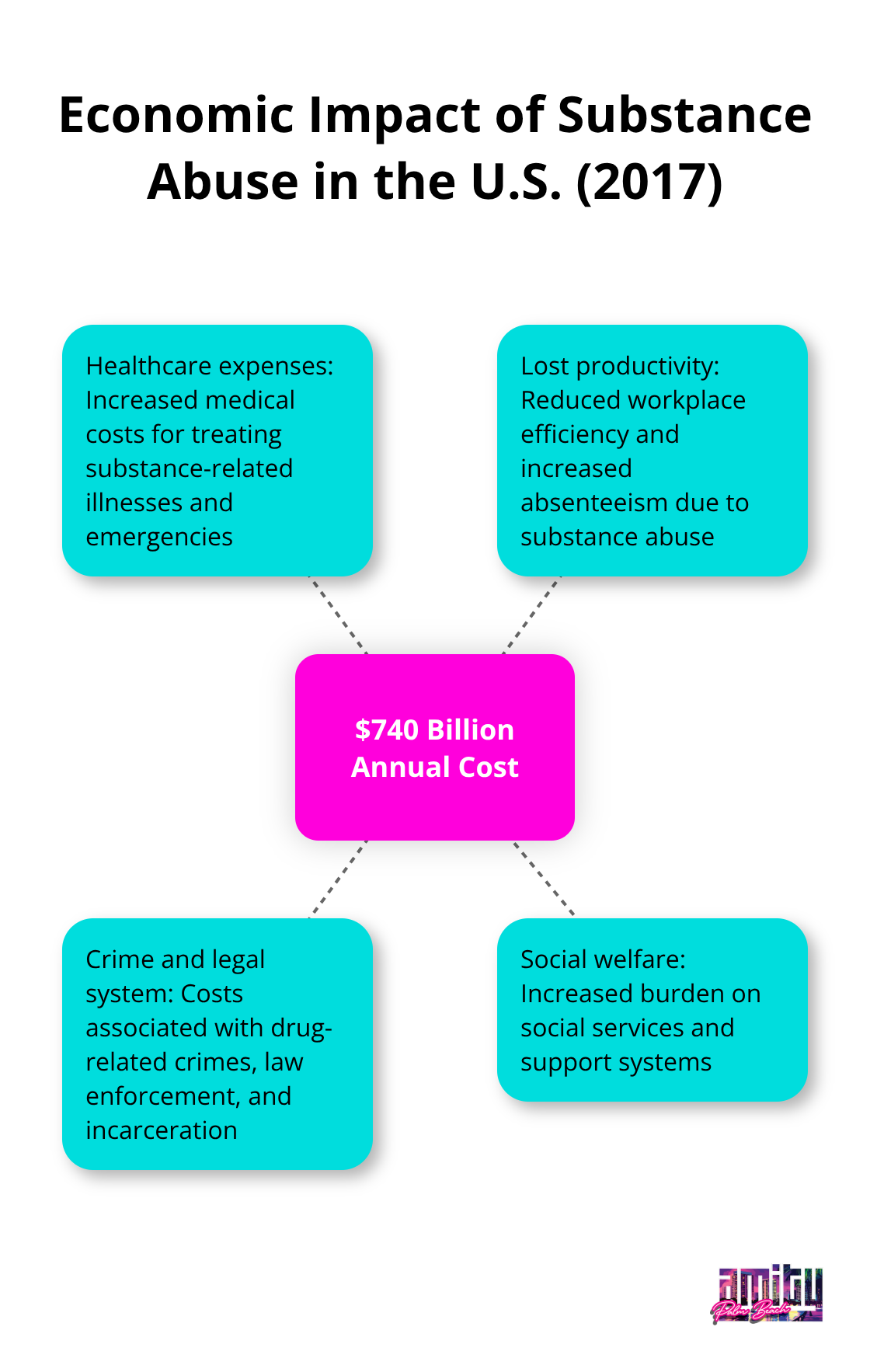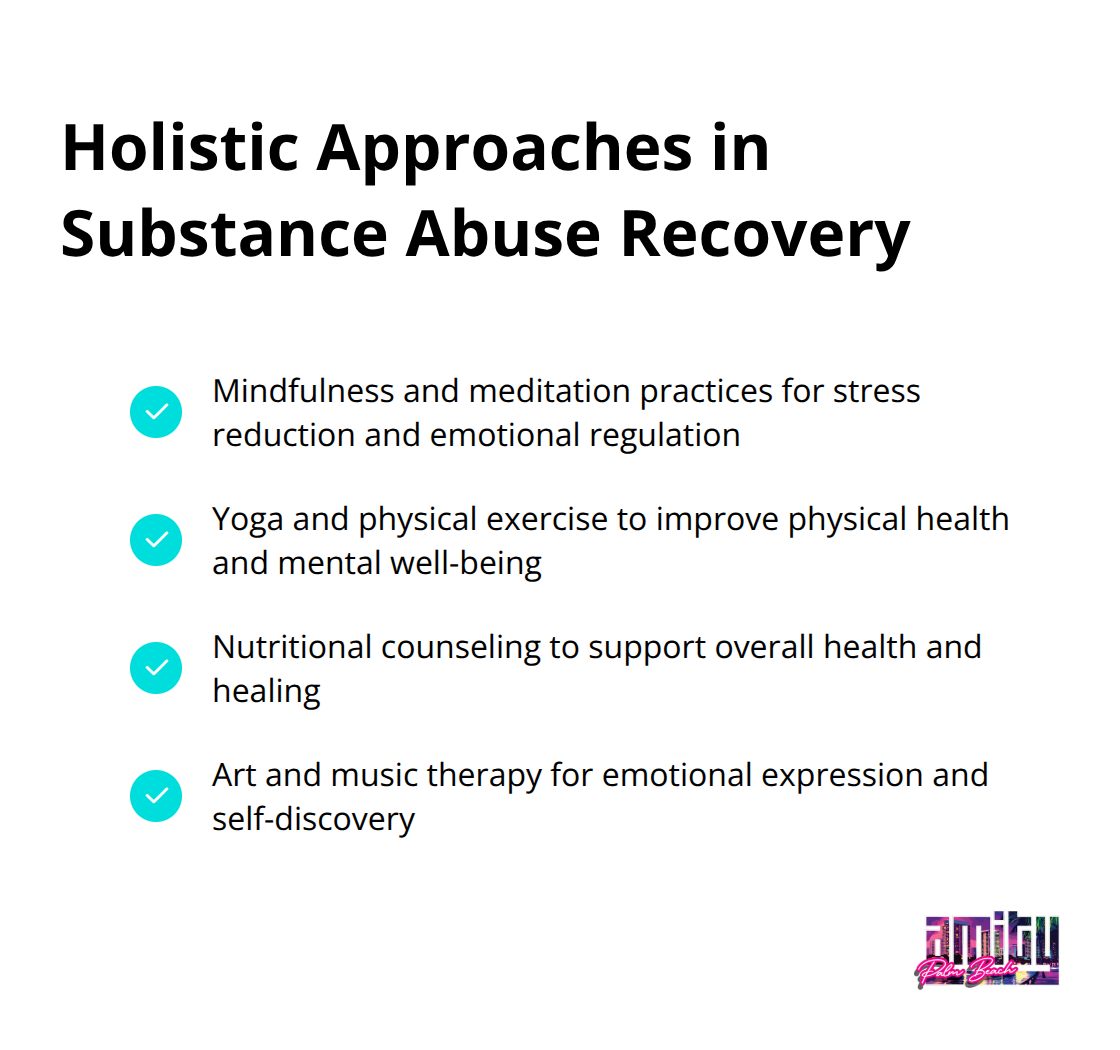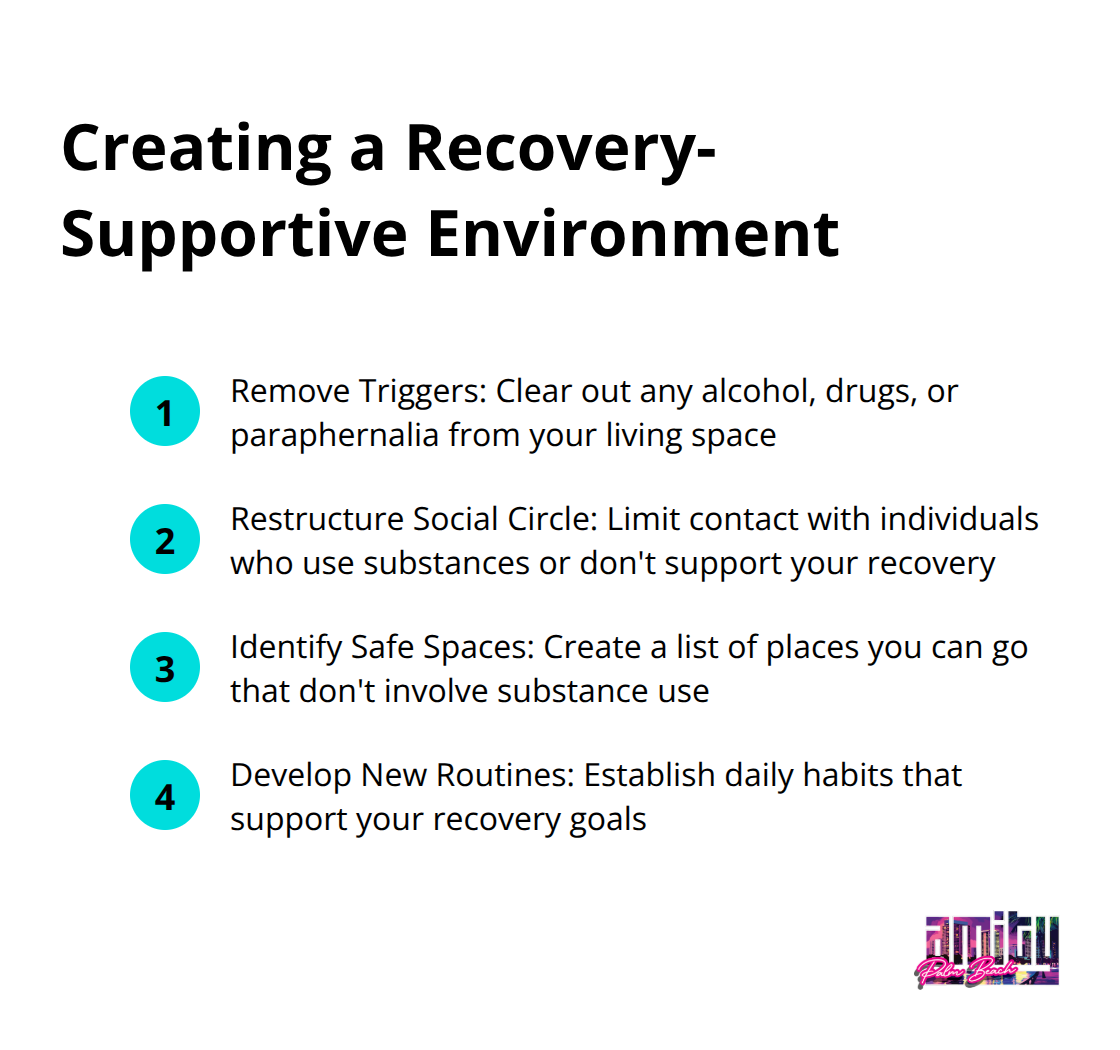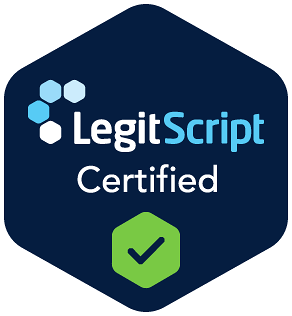Substance abuse is a complex issue that affects millions of lives worldwide. At Amity Palm Beach, we understand the devastating impact it can have on individuals, families, and communities.
Our team of experts has developed effective strategies to help those struggling with addiction overcome their challenges and reclaim their lives. In this post, we’ll explore proven approaches to managing substance abuse and building a strong foundation for lasting recovery.
What Is Substance Abuse?
The Many Faces of Substance Abuse
Substance abuse involves the harmful or hazardous use of psychoactive substances, including alcohol and illicit drugs. The 2019 NSDUH Detailed Tables present national estimates of substance use, mental health, and treatment in the United States. This includes addictions to alcohol, prescription medications, and illegal drugs (such as heroin or cocaine).
Risk Factors and Triggers
Understanding the root causes of substance abuse is essential for effective treatment. Common risk factors include:
- Genetic predisposition
- Mental health disorders
- Childhood trauma or abuse
- Peer pressure and social environment
- Chronic stress or pain
Triggers that can lead to substance use or relapse often include:
- Emotional distress (anxiety, depression, anger)
- Environmental cues (places, people, or objects associated with past drug use)
- Life stressors (job loss, relationship problems, financial difficulties)
The Far-Reaching Impact on Health
Substance abuse takes a severe toll on physical and mental health. Long-term alcohol abuse can lead to liver disease, cardiovascular problems, and increased cancer risk. Opioid addiction can result in respiratory depression and overdose. Stimulant abuse may cause heart problems and psychosis.
Mental health is equally affected. The Substance Abuse and Mental Health Services Administration reports that about 9.5 million adults in the U.S. experienced both mental illness and a substance use disorder in 2019. This co-occurrence complicates treatment and recovery.
Effects on Relationships and Society
The impact of substance abuse extends far beyond the individual. Families often experience financial strain, emotional turmoil, and breakdown of trust. Children of individuals with substance use disorders are at higher risk of developing addiction themselves.
Societally, substance abuse contributes to crime, decreased productivity, and increased healthcare costs. In 2017, the National Institute on Drug Abuse estimated the total annual cost to the nation of substance abuse to be more than $740 billion.

The Path to Recovery
At Amity Palm Beach, we recognize the complexity of substance abuse and its far-reaching effects. Our comprehensive approach addresses not only the addiction itself but also its underlying causes and wide-ranging impacts. We believe that with the right support and treatment, recovery is possible for everyone affected by substance abuse.
As we move forward, it’s important to explore the effective treatment approaches that can help individuals overcome substance abuse and reclaim their lives. These strategies form the foundation of successful recovery programs and provide hope for those struggling with addiction.
Effective Treatment Approaches for Substance Abuse
Medical Detoxification: The First Step
Medical detoxification marks the beginning of many treatment journeys. This process, always supervised by medical professionals, helps individuals manage withdrawal symptoms safely. The latest statistics on detox success rates highlight the importance of this step, especially considering the alarming statistics on drug-involved overdose deaths and the lack of access to drug treatment.
During detox, medical teams monitor vital signs, manage symptoms, and provide emotional support. This phase typically lasts 5-7 days but can vary based on the substance and individual factors.
Cognitive Behavioral Therapy: Changing Thought Patterns
Cognitive Behavioral Therapy (CBT) forms a cornerstone of effective substance abuse treatment. This therapy helps individuals identify and change negative thought patterns and behaviors associated with drug use.
Therapists use CBT techniques to help clients develop coping strategies, manage stress, and build resilience. Regular CBT sessions (both individual and group) significantly improve clients’ ability to maintain long-term sobriety.
Medication-Assisted Treatment: A Promising Approach
Medication-Assisted Treatment (MAT) has shown remarkable success in treating certain substance use disorders, particularly opioid and alcohol addiction. Medications for opioid use disorder reduce the risk of overdose deaths and of behaviors that increase the risk of infectious disease.
MAT integrates into treatment plans when appropriate. Medications like buprenorphine (for opioid addiction) or naltrexone (for alcohol dependence) work in conjunction with counseling and behavioral therapies. This combination addresses both physical and psychological aspects of addiction.
It’s important to note that MAT isn’t a one-size-fits-all solution. Medical teams must carefully assess each client to determine if MAT is appropriate and which medications might prove most effective.
Holistic Approaches: Healing the Whole Person
While evidence-based therapies form the core of treatment programs, incorporating holistic approaches can enhance overall well-being and support long-term recovery. These may include:
- Mindfulness and meditation practices
- Yoga and physical exercise
- Nutritional counseling
- Art and music therapy

Personalized Treatment Plans: Tailoring Care
Personalization stands as the most critical aspect of effective substance abuse treatment. No two individuals experience addiction in the same way, and treatment plans must reflect this diversity.
Thorough assessments help understand each client’s unique circumstances, including:
- Substance use history
- Co-occurring mental health conditions
- Physical health status
- Family and social support systems
- Personal goals and motivations
Based on this information, tailored treatment plans evolve as clients progress through recovery. This flexibility allows treatment providers to address emerging challenges and capitalize on individual strengths.
Effective substance abuse treatment combines medical detoxification, evidence-based therapies (like CBT and MAT), holistic approaches, and personalized treatment plans. This comprehensive approach has helped countless individuals overcome addiction and reclaim their lives. The next chapter will explore how building a strong support system plays a vital role in sustaining long-term recovery.
How to Build a Robust Recovery Support System
Engage Family and Friends in Recovery
Family involvement improves recovery outcomes significantly. A study showed that patients who received Multi-Family Therapy for Recovery Treatment (MFT-RT) benefited more from the intervention, reducing their substance abuse. Here’s how to involve loved ones effectively:
- Education: Family members should attend workshops or therapy sessions to understand addiction and recovery.
- Open Communication: Set up regular family meetings to discuss progress, challenges, and needs.
- Boundary Setting: Work with a therapist to establish healthy boundaries that support recovery.
Leverage Support Groups and 12-Step Programs
Support groups provide an invaluable sense of community and shared experience. According to a study by Kelly published in the Journal of Substance Abuse Treatment (2018), individuals who attended support groups regularly were more likely to maintain sobriety.
- Find the Right Fit: Explore various groups (AA, NA, SMART Recovery) to find one that resonates.
- Commit to Attendance: Try to attend at least one meeting per week, more during challenging times.
- Get a Sponsor: A dedicated mentor can provide personalized guidance and accountability.
Develop Healthy Coping Mechanisms
Replacing substance use with healthy coping strategies is essential for long-term recovery. Here are some effective techniques:
- Mindfulness Meditation: Studies show it can reduce cravings.
- Exercise: Regular physical activity releases endorphins, improves mood, and reduces stress.
- Creative Outlets: Art, music, or writing can provide emotional release and self-expression.
- Stress Management: Learn and practice techniques like deep breathing or progressive muscle relaxation.
Create a Substance-Free Environment
Your immediate surroundings play a significant role in maintaining sobriety. Take these steps to create a recovery-supportive environment:
- Remove Triggers: Clear out any alcohol, drugs, or paraphernalia from your living space.
- Restructure Social Circle: Limit contact with individuals who use substances or don’t support your recovery.
- Identify Safe Spaces: Create a list of places you can go that don’t involve substance use.
- Develop New Routines: Establish daily habits that support your recovery goals.

Implement Aftercare Strategies
Aftercare is a necessity for long-term recovery. Research shows that individuals who engage in aftercare programs have lower relapse rates than those who don’t.
- Continued Therapy: Regular check-ins with a therapist can help address ongoing challenges.
- Alumni Programs: Many treatment centers offer alumni support groups and events.
- Sober Living: Consider transitional housing to provide structure and support in early recovery.
- Ongoing Education: Attend workshops or classes to continue developing recovery skills.
Final Thoughts
Substance abuse management requires effective strategies and strong support. We explored key approaches including medical detoxification, evidence-based therapies, and personalized care plans. These methods form the foundation of successful substance abuse treatment and provide hope for those struggling with addiction.
A robust support system plays a vital role in long-term recovery. Family engagement, support group participation, and healthy coping mechanisms reinforce the path to lasting sobriety. Creating a substance-free environment and implementing aftercare strategies further strengthen recovery efforts.
Professional help is essential for overcoming substance abuse challenges. At Amity Palm Beach, we offer comprehensive treatment programs tailored to individual needs. Our experienced team provides compassionate care and evidence-based treatments to support your recovery journey. Take the first step towards a healthier future today.




